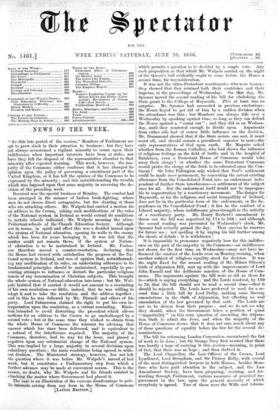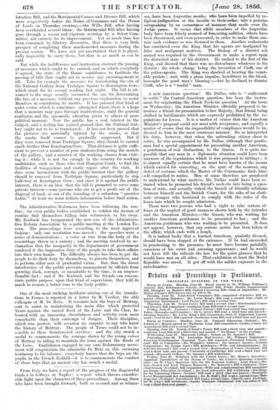NEWS OF THE WEEK.
" IT this late period of the session," Members of Parliament are apt to grow slack in their attention to business ; but they have not always accustomed a vigilant minority to count upon their indifference when important interests have been at stake, nor have they left the disposal of the representative chamber to that minority:after repeated warning. This week, however, the ma- jority of the Commons ,eitlier confesses that it has changed its opinion upon the policy of governing a constituent part of the United Kingdom, or it has left the opinion-of the Commons to be eipressed by the minority ; and this notwithstanding the trouble which. was imposed-upon that.same-majority in reversing the de-
cision of the preceding week. - - Reversal was the special business of Monday. The combat had been arranged in the manner of Indian bush-fighting, where men do not choose direct antagonists, but fire slanting at those who are attacking others. Mr. Walpole had carried a motion for an address to the Crown, asking such modifications of the rules of the National system in Ireland as would extend its conditions to certain schools' indicated ; Mr. Walpole meaning the ultra- Protestant schools of the' Church Education Society. Although not in terms, in spirit and effect this was a decided inroad upon the system of National education, opening its walls to the enemy which has been for years besieging it. It was felt that the matter could not remain there, if the system of Nation- al education is to be maintained in Ireland. Mr. Fortes- cue therefore moved a counter-resolution, declaring that the House had viewed with satisfaction the progress of the Na- tional system in Ireland, and was of opinion that, notwithatand-' ing any modification of its rules, an undeviating adherence to its fundamental principles should he maintained, especially in pre- venting attempts to influence or disturb the particular religious tenets of any denomination of Chrititian subjects. - This brought the whole system of National education into issue ; but Mr. Wal- pole insisted. that if carried it would not amount to a rescinding of his own resolution—so little, indeed, that he was Willing to adopt it and.to take the resolution and the address together ; and in this he was followed by Mr. Disraeli and others of his party. Lord Palmerston claimed the right to put his own'in- terpretation upon the resolution as a virtual rescinding. Minis- ters intended to avoid disturbing the precedent which allows motions for an address to the Crown to go unchallenged by a second vote ; but at the same time they wished to obtain from the whole - House of Commons the warrant for advising that answer which 'has since been delivered, and is equivalent to a refusal of the interference required. The majority of the Commons, therefore, had its way for the hour, and placed a negative upon any substantial change of the National system. This was implied by a large majority in several divisions upon subsidiary questions ; the main resolutions being agreed to with- out division. The Ministerial strategy, however, has not left the question where it was before Mr. Walpole's inroad of last week, but it constitutes a Parliamentary step from which a further advance may be made at convenient season. This is the reason no doubt, why Mr. Walpole and his friends assisted in clinching the matter where Government had placed it. The ease is an illustration of the extreme disadvantage to pub- lic interests arising from any form in the- Heine Of Commons [LATEST EDITION.] which permits a question to be decided by a single vote. Any such proposition as" thatwhich Mr. Walpole carried on the night of the Queen's ball evidently ought to come before the House a second time, for reconsideration.
It was not the ultra-Protestant reactionaries who were beaten: - they showed that they retained both their confidence and their impetus, in the proceedings of Wednesday. On that day, Mr. - Spooner moved the second reading of his bill for abolishing the State grant to the College of Maynooth. This at least was no
s -*prise. Mr. Spooner had succeeded in previous resolutions.: the House hoped -to- get. rid of him by a sudden division When the attendance was thin ; but Members can always tide over , a Wednesday by speaking against time, so long as they can defend . the House against a " count out " ; and they did so on Wednes- day, until they mustered enough to divide upon. Argumenta from either side had of course little -influence on the decision.
Mr. Drummond showed "that if the State assists one sect, it must assist all, and ihoidd sustain a priesthood superior to seetthe
only representatives of God upon. earth. Mr. Maguire asked whether from the Roman Catholics, Who had sheYin the influence of religious feelings on the field of battle and in the hospital of Balaklava, even a Protestant House of Conimons would • take away their clergy ? or whether the same Protestant Commons • would prefer the clergy of the Irish to be educated upon the Con- tinent ? Sir John Pakington only wished that Peel's settleMent could be made more permanent; by converting the actual existing
allowance from the Consolidated FUnd into an endowment bide- pendent of further State interferenee—a settlement of the aubject
once for all. But the endowment itself would not be impregim7
ble to sequestration by a reactionary Movement:- The danger for Itaynooth, Or fOr the religious and social tranquillity of -Ireland',
does not lie in the particular form of the endowment,_ or, the cle- pefidence on the Consolidated Fund ; it lies in the conduit 'of a Liberal majority, whose indifference gives strength to the itetWity. of -a- reactionary party. Mr. Henry Herbert'S aMendinent to - throw out the bill was negatived. by 174 to 148 ; and 'although the second reading was prevented by Wednesday's- clock, Mr. Spooner had actually gained the day. That success he reserves for future' use ; not spoiling it by urging his bill further among the shoals of debate : it is withdrawn ! • It is impossible" to pronounce negatively how far this indiffer- ence on the part of the majority in the Commonsan indifference not shown for the first time on Wednesday—may. not- have in- fluenced the conduct of the Lords even on Monday evening, when '- another subject of. religious equality stood for decision. -It was - the night. fixed for the second reading of Mr. Milner Gibson's Oath of Abjuration Bill, sent up with the improvements of Lord -
Sohn Rtiasell and the deliberate sanction of the Reuse of COM- mons. The arguments againit. the bill were as old as those for it—which-is saying, everything ; 'and the Lordi resolved, by 110 to 78, that the bill shoidd not be read a second time-:--that it should be rejected. The Lords have preferred to read for a se-
cond time a little bill by Lord Derby, making some literary emendations in the Oath of Abjuration, but effecting ne - real. emendation of the law governed by that oath. The Lords-are ' not to be driveU from their purpose ; and we do not see why
they should, when the Government takes a position of quasi " impartiality " on this very question of amending the AbjuraL
tion Oath to admit the Jews, and when .the majority of any Honse of Commons shows that' it does not care "much' abont any of those questions of equality before the liw; fer the several de- nominations.
- The-bill for reforming London Corporation encumbered the list of work to be done ; but Sir George Grey" first avowed that there was hardly a hope of carrying it this session—meaning, -in point of fact, that there was no hope ; and then shelved it.
The Lard Chancellor, the Law Officers of the Crown, Lord Lyndhurst, Lord Brougham, and Sir Fitzroy Kelly, with several of the most distinguished lawyers in both Honks, besides Mem- bers who have paid attention to", the subject, and. the Law Amendment Society, have been preparing, revising, and for- Warding through Parliament, various measures of practical im- provement in the law, upon the general necessity of which everybody is agreed. Two of these were the Wills and Admin- istration Bill, and the Matrimonial Causes and Divorce Bill, which were respectively before the House of-Commons and the House of Lords on Thursday evening,—the Wills Bill, after having been overhauled several times ; the Matrimonial Bill after having gone through a recent and vigorous revision. by a Select Com- mittee, not entirely for its improvement. Yet so much time has been consumed by dilatory discussion, that there is very little prospect of completing these much-needed measures during the present session. We have not yet ascertained that it is physi- cally impossible to carry them, but that is as much as can be said.
But while the indifference and inattention obstruct the passing of measures which ought to be carried, and on which everybody is agreed, the state of the House contributes to facilitate the passing of bills that ought not to receive any encouragement at all. Take for example the measure for transferring the site of the National Gallery from Trafalgar Square to Kensington Gore, which stood for its second reading last night. The bill is ad- vanced to the stage usually accounted the one for determining the fate of a measure, without any previous explanation to assist Members in considering its merits. It has pursued that kind of quiet course which is sometimes attempted where there is a hope that a measure may pass through inadvertence, amid the general confusion and the spasmodic attention given to others of more political moment. Now the public has a real interest in the subject, and a feeling has gained ground that the National Gal- lery ought not to be so transferred. It has not been proved that the pictures are materially injured by the smoke, or that the smoke itself cannot be gradually suppressed. But if they were removed from Trafalgar Square, they should be carried much further than Kensington Gore. That distance is quite suffi- cient to prevent a number of poor students from using the models of the gallery, and a number of the working classes from visit- ing it ; while it is not far enough in the country for working multitudes, such as those who visit Hampton Court, to find the facilities of tea-gardens and rustic repose after the visit. It Zees seem inconsistent with the public interest that the gallery should be removed from Trafalgar Square, particularly to stop half-way at Kensington Gore ; and since it is against the public interest, there is an idea that the bill is promoted to serve some private interest—some persons who are to get a profit out of the disposal of land, or out of the founding of a suburban " quartier Latin." At least we want definite information before final action.



























